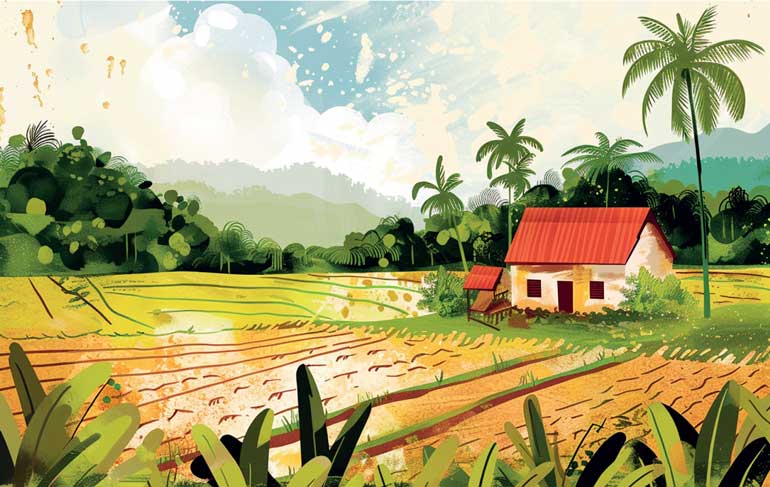Monday Mar 02, 2026
Monday Mar 02, 2026
Saturday, 5 October 2024 00:01 - - {{hitsCtrl.values.hits}}

 There is a need to transform food systems in the face of the climate crisis and make more sustainable use of natural ecosystems, resources, and biodiversity. As outlined by the Intergovernmental Panel on Climate Change (IPCC) with high confidence in its latest assessment report (AR6), “climate change impacts are stressing agriculture, forestry, fisheries, and aquaculture, increasingly hindering efforts to meet human needs,” including negative impacts on food security, livelihoods, human health, and economic growth. Climate-related risks to food systems are an especially severe threat to tropical and subtropical developing countries with high employment in relevant sectors, including Sri Lanka.
There is a need to transform food systems in the face of the climate crisis and make more sustainable use of natural ecosystems, resources, and biodiversity. As outlined by the Intergovernmental Panel on Climate Change (IPCC) with high confidence in its latest assessment report (AR6), “climate change impacts are stressing agriculture, forestry, fisheries, and aquaculture, increasingly hindering efforts to meet human needs,” including negative impacts on food security, livelihoods, human health, and economic growth. Climate-related risks to food systems are an especially severe threat to tropical and subtropical developing countries with high employment in relevant sectors, including Sri Lanka.
At the global level, food systems have been identified as a key area for climate change adaptation and resilience-building. The IPCC report states that “effective adaptation options, together with supportive public policies, enhance food availability and stability and reduce climate risk for food systems while increasing their sustainability,” highlighting the importance of evidence-based and well-planned interventions. In the multilateral climate negotiations, food systems were also included as one of seven thematic targets under the Global Goal on Adaptation and the UAE Framework for Global Climate Resilience, aiming to attain “climate-resilient food and agricultural production and supply and distribution of food, as well as increasing sustainable and regenerative production and equitable access to adequate food and nutrition for all” by 2030 and progressively beyond.
Key actors for resilient food systems
Sri Lanka’s food systems are vulnerable to climate change impacts, including rising day- and nighttime temperatures, unpredictable precipitation patterns, extreme weather events, prolonged droughts, pests and diseases, saline intrusion, soil degradation, or loss of ecosystem services. To address these challenges and build long-term resilience, the sector needs to modernise, strengthen adaptation measures, build relevant capacities, and transition to more climate-smart, integrated, resilient, and risk-informed approaches.
For this process to be successful, multiple actors and stakeholder groups need to work together, from producers at the ground level and their associations to national government authorities as well as consumers and waste management at the end of value chains. However, for any of these actors, data, information, knowledge, and research findings are essential to enable informed decision-making and evidence-based interventions that are effective and address clearly identified issues.
The role of research providers
Research providers, such as research institutions, universities, think tanks, relevant government departments, and individual experts, play a key role in bridging data and evidence gaps and enabling long-term resilience-building. They are at the forefront of generating knowledge about the impacts of climate change and other related risks on food systems, for example on how changing climatic conditions affect crop yields, soil health, water availability, and pest and disease dynamics. This knowledge is crucial for understanding the vulnerabilities of different food systems and identifying areas that require urgent attention.
For instance, research on the physiological responses of crops to temperature and water stress helps identify which crop varieties are more resilient to climate change. Similarly, studies on the impact of climate change on pest and disease patterns enable the development of more effective pest management strategies. By understanding these impacts, research providers lay the foundation for developing targeted interventions that enhance the resilience of food systems.
Moreover, research on sustainable and climate-smart food system practices, such as agroforestry, integrated pest management, or conservation agriculture, can offer alternative methods and models for food producers and processors. These practices have the potential to not only improve climate resilience but also contribute to environmental sustainability and resource efficiency. Technology and research and development are other areas of importance, including when it comes to climate information services, early warning systems, weather forecasting tools, remote sensing, mobile applications, and machine learning to support risk analytics or tailor agrometeorological recommendations to a specific area or even farm.
Research providers can—and often do—fulfil additional functions as well. This can include education, training, and capacity-building, for example, through the integration of climate change into university curricula, offering specialised courses, and equipping students with the knowledge and skills to address climate-related challenges to food systems. They can directly engage with stakeholders on the ground, including farmers and extension services, and transfer knowledge on climate-smart practices to the grassroots level. In the other direction, research can also feed into policy processes by providing scientific evidence and research-backed recommendations, supporting policymakers to strengthen the enabling environment and incorporate evidence into policies and plans.
The complexity of building climate-smart and resilient food systems requires collaboration across various sectors and stakeholders, as well as between the national and international level. Research providers and academic institutions are actively engaged in partnerships with government agencies, civil society stakeholders, and the private sector. These collaborations can facilitate the sharing of knowledge, resources, and expertise, leading to more effective and coordinated efforts in addressing climate challenges.
Furthermore, research providers can also become thought leaders and agenda-setters as they identify emerging or frontier solutions, highlight evidence-based priorities, and contribute to shaping regional or global discussions, such as the development of indicators under the targets for the Global Goal on Adaptation, which is currently taking place under the UAE-Belém work programme. Monitoring, evaluation, learning, and reporting also are critical for the development of Nationally Determined Contributions, National Adaptation Plans, physical planning, and short-, mid-, and long-term development plans.
Conclusions
Research providers are central for the development and implementation of a successful food system transformation towards climate change adaptation, sustainability, and long-term resilience. By providing data and research as well as education, training, and innovation, the work of these institutions is necessary to ensure food security, protect livelihoods, and promote sustainable development in the face of a changing climate.
(The writer works as Director: Research & Knowledge Management at SLYCAN Trust, a non-profit think tank based in Sri Lanka. His work focuses on climate change, adaptation, resilience, ecosystem conservation, just transition, human mobility, and a range of related issues. He holds a Master’s degree in Education from the University of Cologne, Germany and is a regular contributor to several international and local media outlets.)